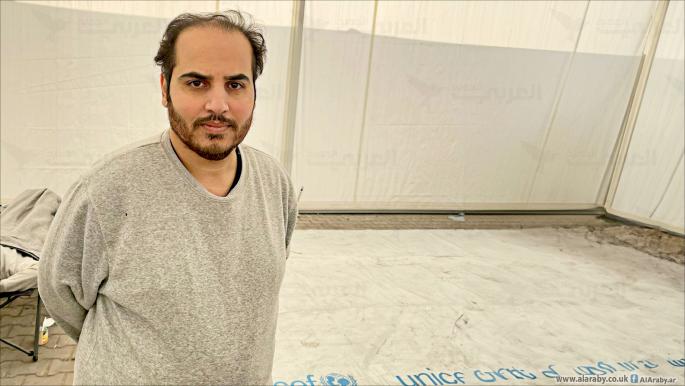The kidnapping of Diaa Al-Kahlout came under Israel’s wider violations of the rights of Palestinians in Gaza, including journalists covering the genocidal war on the besieged enclave.
Israel has released Al-Araby Al-Jadeed’s Gaza correspondent and bureau chief, Diaa Al-Kahlout, on Tuesday following a month-long detention, the Doha-based outlet confirmed.
Israel released Al-Kahlout through the Karem Abu Salem crossing in the south of the Gaza Strip and was taken to a hospital for a health checkup.
Israeli occupation forces detained Al-Kahlout on December 7, 2023, among dozens of Palestinians in Beit Lahia, northern Gaza. The Palestinians were forced to strip off their clothes and were humiliated before being taken to an unknown location, the news outlet reported at the time.
Israeli media claimed the kidnapped Palestinians were “Hamas suspects,” a common allegation by the occupying state to justify its crimes against Palestinians.
Al-Araby Al-Jadeed noted that the occupation forces had disregarded international demands for its correspondent’s release, especially in light of his deteriorating health conditions.
The Committee to Protect Journalists had echoed calls for Al-Kahlout’s release on December 7, saying it was “deeply concerned” over his arrest.
“The Israeli army should disclose his location, release him immediately, and take steps to ensure the safety of all journalists covering this war, especially those in Gaza who face imminent harm,” Sherif Mansour, CPJ’s Middle East and North Africa Program Coordinator in Washington, D.C, said.
The kidnapping of Al-Kahlout came under Israel’s wider violations of the rights of Palestinians in Gaza, including journalists covering the genocidal war on the besieged enclave.
Since October 7, Israel has killed at least 23,210 Palestinians in Gaza while injuring 59,167 others, according to the latest figures by the Strip’s health authorities.
The figure includes 109 Palestinian journalists killed since the beginning of the war, according to the Palestinian Journalists Syndicate (PJS). Journalist Abdullah Iyad Baris became the latest victim of Israel’s targeting of the press on Monday.
The occupation forces have been targeting journalists’ families as part of their attempt to silence the media coverage of the atrocities in Gaza.
On Monday, Israel killed the mother of Al-Araby TV’s Gaza correspondent, Ahmed Al Batta, alongside his sisters, nephews and nieces in Khan Younis, the south of the Strip.
A viral video online showed the bereaved journalist breaking down upon receiving the news of his family’s death over the phone. Al Batta told the Qatar-based broadcaster that he was preparing to move them to a safer place.
The attack came 24 hours apart from the killing of Hamza Dahdouh, the eldest son of Al Jazeera’s bureau chief, Wael Dahdouh, on Sunday.
Israel killed Hamza, 27, along with Palestinian journalist Mustafa Thuraya, in a direct missile strike in western Khan Younis in Gaza. The Israeli forces targeted the journalists’ vehicle as they were heading to Al-Mawasi, an area that had been presumed to be safe, according to Al Jazeera.
On October 25, Israel killed Dahdouh’s wife, 15-year-old son, seven-year-old daughter and infant grandson in a strike in the south, despite Israel announcing the area to be a safe zone before the attack.
Dahdouh then survived a missile strike on December 15 in Khan Younis, where Al Jazeera’s cameraman, Samer Abu Daqqa, succumbed to his injuries after being left to bleed for six hours.
Israeli forces prevented medics from reaching him with nonstop shelling and the ambulances had to receive prior approval to reach Abu Daqqa, according to Al Jazeera.
Dahdouh’s arm was injured by a shrapnel from the Israeli airstrike and Palestinians managed to get him to the Nasser Hospital in Gaza, where he underwent surgery in his arm.
PJS filed a brief in the United States federal court on January 2 to halt military and diplomatic backing of Israel. The lawsuit was brought by the U.S.-based Center for Constitutional Rights and the law firm Van Der Hout LLP.
“These journalists and media workers were deliberately targeted with the intent of assassination and murder, in precise Israeli attacks on their homes. Many of them also received direct and repeated death threats before they were targeted, which indicates that the assassination of journalists by Israel is systematic,” PJS said in a statement.
Journalists have been among Israel’s prime targets in southern Lebanon, where cross-border fighting between Hezbollah and Israel intensified.
Israel had killed Reuters videographer, Issam Abdallah, on October 13 and severely injured six other international press members, including Al Jazeera’s, during their coverage of the Israel-Hezbollah attacks in Alma Al-Chaab in the Tyre governorate, southern Lebanon.
The Israeli attack caused the amputation of the leg of AFP photographer, Christina Assi, according to the French news agency.
Another Israeli airstrike on November 21 then killed Al Mayadeen’s correspondent, Farah Omar, alongside cameraman Rabih Me’mari in Tayr Harfa, South Lebanon.
On December 23, the Al-Manar crew survived an Israeli strike on the Al-Khardali area, south of Lebanon.
An Amnesty International investigation published on December 7 regarding the first incident found that the Israeli occupation forces knowingly targeted the seven-member press crew.
“Those responsible for Issam Abdallah’s unlawful killing and the injuring of six other journalists must be held accountable[…]Israel must not be allowed to kill and attack journalists with impunity,” Aya Majzoub, Amnesty International’s Deputy Regional Director for the Middle East and North Africa, said today while announcing the probe’s outcomes.
The findings echoed a Reporters Without Borders (RSF) investigation on October 29, which found Israel deliberately targeted the slain Reuters journalist and the other six press members.
Al Jazeera’s correspondent Carmen Joukhadar — who was among the journalists on site — had told RSF that an Israeli helicopter was already hovering over the area and could spot the press crew long before the bombing.
“According to their testimonies, an Israeli helicopter flew over them before a missile fell next to their car — of the same model as the one bombed on 13 October — also bearing the word ‘press’,” RSF said.







